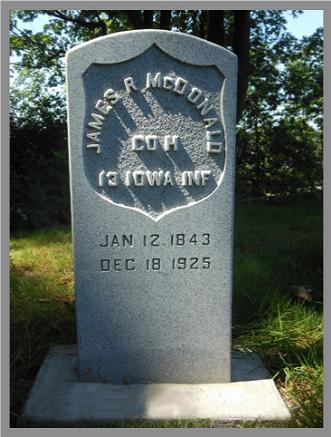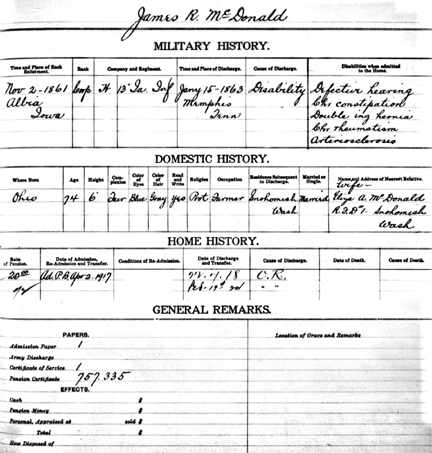James Renwick McDonald was born in Ohio in January 1843 and stated in the 1900 U.S. Census that his father was born in Virginia and his mother in Pennsylvania. The 1860 U.S. census shows James living in Albia, Iowa with his uncle and aunt, Alexander and Nancy McDonald. James was working as a day laborer, his uncle was a carpenter and his aunt was a domestic worker. Both James and Alexander served in the Civil War as volunteers in the Iowa Infantry. Information about James' Civil War service is shown below.
Military Record of James Renwick McDonald
Residence: Albia, Iowa
Age at enlistment: 19
Birth Date: abt 1842
Enlistment Date: 15 Oct 1861
Rank at enlistment: Private
State Served: Iowa
Service Record: Enlisted in Company H, Iowa 13th
Infantry Regiment on 02 Nov 1861. Promoted to Full
Corporal. Mustered out on 15 Jan 1863 at Memphis, TN.
REGIMENT: 13th Infantry Regiment Iowa
Date of Organization: 18 Oct 1861 Muster Date: 21 Jul 1865
Regiment State: Iowa
Regiment Type: Infantry
Regiment Number: 13th
Officers Killed or Mortally Wounded: 5
Officers Died of Disease or Accident: 4
Enlisted Killed or Mortally Wounded: 114
Enlisted Died of Disease or Accident: 205
Fought on 6 Apr 1862 at Shiloh, TN.
Fought on 3 Oct 1862 at Corinth, MS.
Fought on 4 Oct 1862 at Corinth, MS.
Fought on 6 Oct 1862 at Corinth, MS.
Fought on 16 May 1863 at Raymond, MS.
Fought on 16 Jun 1863 at Vicksburg, MS.
Fought on 9 Feb 1864.
Fought on 10 Feb 1864 at Hillsboro, MS.
Fought on 28 Feb 1864 at Canton, MS.
Fought on 29 Feb 1864 at Canton, MS.
Fought on 21 Mar 1864.
Fought on 26 Jun 1864.
Fought on 27 Jun 1864.
Fought on 2 Jul 1864 at Kennesaw Mountain, GA.
Fought on 3 Jul 1864 at Kennesaw Mountain, GA.
Fought on 4 Jul 1864 at Kennesaw Mountain, GA.
Fought on 4 Jul 1864 at Atlanta, GA.
Fought on 5 Jul 1864 at Kennesaw Mountain, GA.
Fought on 6 Jul 1864 at Kennesaw Mountain, GA.
Fought on 8 Jul 1864 at Kennesaw Mountain, GA.
Battles Fought by the 13th Infantry Regiment
Fought on 2 Aug 1864 at Atlanta, GA.
Fought on 9 Aug 1864 at Atlanta, GA.
Fought on 11 Aug 1864 at Atlanta, GA.
Fought on 14 Aug 1864 at Atlanta, GA.
Fought on 19 Aug 1864 at Atlanta, GA.
Fought on 20 Aug 1864 at Atlanta, GA.
Fought on 25 Aug 1864 at Atlanta, GA.
Fought on 1 Sep 1864 at Jonesboro, GA.
Fought on 5 Sep 1864 at Jonesboro, GA.
Fought on 15 Dec 1864 at Savannah, GA.
Fought on 1 Feb 1865.
Fought on 19 Feb 1865 at Columbia, SC.
Fought on 1 Mar 1865 at Falling Creek, NC.
Fought on 8 Jul 1864 at Atlanta, GA.
Fought on 9 Jul 1864.
Fought on 11 Jul 1864 at Atlanta, GA.
Fought on 20 Jul 1864 at Atlanta, GA.
Fought on 21 Jul 1864 at Atlanta, GA.
Fought on 22 Jul 1864 at Atlanta, GA.
Fought on 28 Jul 1864 at Atlanta, GA.
this is a record of James' temporary admission to the U.S. Home for Disabled Veterans in Sawtelle, Los Angeles County, California in 1917
The regiment closed its fighting career at Bentonville. At Goldsboro it was joined by a large number of recruits and here Capt. Pope was made major in place of Maj. Marshall resigned.
The regiment proceeded to Washington after Johnston's surrender, took part in the grand review, went into camp at Rock Creek and later moved to Louisville, Ky., where it was mustered out in July 1865. (Source: The Union Army, vol. 4)
Regimental History Thirteenth Infantry IOWA (3 years)
Colonels: Marcellus M. Crocker, John Shane, James C. Wilson;
Lieutenant-Colonels: Milton M. Price, John Shane, James C. Wilson, Justin C. Kennedy;
Majors: John Shane, George M. Van Hosen, James C. Wilson, William A. Walker, Thomas P. Marshall, A. J. Pope;
It participated in the expedition to Monroe, La., after which it went into quarters at Vicksburg until Feb. 4, 1864, when it joined the movement towards Meridian. The veterans were given a furlough in March and reached Cairo on April 16, with many recruits. It proceeded via Clifton and Pulaski, Tenn., to Huntsville, Ala., and on May 20, joined Sherman's army at Acworth, Ga.
It was engaged at Kennesaw Mountain, was in a skirmish at Nickajack creek, and at Atlanta its brigade made a charge to within 50 paces of the fort, being compelled to lie down and fire. It retired in good order having lost 113 in killed and wounded in less than 30 minutes.
On July 22 most of Co. A, part of G. and all of D and K, were captured while reinforcing the 11th and 16th Ia. The regiment's loss in this battle was 149, Maj. Walker commanding, being killed. In the battle of the 28th the regiment fought with great bravery and joined with the remnant of the 3rd Ia., in reinforcing a part of the line which was being hard pressed. The 13th was engaged at Jonesboro and Lovejoy's Station and joined in the pursuit of Hood in October, going as far as Gaylesville, Ala. Its losses from the first day at Kennesaw until the close of the Atlanta campaign were 331 in killed wounded and captured.
At Marietta, on the return to Atlanta, Col Shane and several line officers were mustered out, their time expiring. It was in the march to and siege of Savannah, took up the line of march through the Carolinas, was engaged at Pocotaligo; at Columbia a portion of the regiment crossed the river opposite the city ahead of the army, and without orders hoisted the stars and stripes on the capitol while the remainder of the command engaged in laying pontoon bridges some 3 miles below the town. Previous to this the regiment on the skirmish line had crossed a burning bridge at the North Edisto River and driven the enemy out of Orangeburg.
Source: Official Records: Series I. Vol. 10. Part I, Reports. Serial No. 10
Shiloh After Battle Report
Col. Marcellus M. Crocker, Thirteenth Iowa Infantry.
HDQRS. THIRTEENTH REGT. IOWA INFANTRY VOLS.,
Camp near Pittsburg, Tenn., April 8, 1862.
SIR: I have the honor to report the part taken by the Thirteenth Regt. Iowa Volunteer Infantry in the engagement with the enemy on the 6th and 7th instant.
Early in the morning of the 6th the alarm was given, and heavy firing in the distance indicated that our camp was attacked. The regiment was formed in front of its color line, its full force consisting of 717 men, rank and file.
It was at once ordered to form on the left of the Second Brigade, and proceeded to that position at a doublequick, and was then formed in line of battle in a skirt of woods bordering on an open field to the left of battery. Here it remained inactive for some time, while the enemy's guns were playing on our battery. In the mean time a large force of the enemy's infantry were filing around the open field in front of our line, protected by the woods and in the direction of our battery, opening a heavy fire of musketry on the infantry stationed on our right and charging upon the battery.
The infantry and battery to the right having given way, and the enemy advancing at doublequick, we gave them one round of musketry and also gave way. At this time we (as, indeed, all our troops in the immediate vicinity of the battery) were thrown into great confusion, and retired in disorder.
Having retired to the distance of 100 or 200 yards we succeeded in rallying and forming a good line; the Eight and Eighteenth Illinois Volunteers on our left, and having fronted to the enemy, held our position there under a continual fire of cannon and musketry until after 12 o'clock, when we were ordered to retire and take up a new position. This we did in good order and without confusion. Here, having formed a new line, we maintained it under incessant fire until 4.30 o'clock p. m., the men conducting themselves with great gallantry and coolness, and doing great execution on the enemy, repulsing charge after charge, and driving them back with great loss.
At 4.30 o'clock p. m. we were again ordered to fall back. In obeying this order we became mixed up with a great number of regiments falling back in confusion, so that our line was broken and the regiment separated, rendering it very difficult to collect it; but finally, having succeeded in forming, and being separated from the brigade, we attached ourselves to the division commanded by Col. Tuttle, of the Second Iowa Volunteers, and formed with his division in front of the encampment of the Fourteenth, Second, and Seventh Iowa Volunteers, where it sustained a heavy fire from the enemy's battery until dark, and there remained during the night on our arms. During the day we were under fire of the enemy for ten hours, and sustained a loss of 23 killed and 130 wounded.
On the morning of the 7th we were ordered to continue with Col. Tuttle's division and to follow up and support our forces that were attacking and driving back the enemy. We followed them up closely, moving to support the batteries until the enemy was rounded, after which we were ordered to return to the encampment that we had left on Sunday morning. Our total loss in the action of April 6th and 7th was: Killed, 24; wounded, 139; missing, 9; total, 172.
The men for the most part behaved with great gallantry, and the officers exhibited the greatest bravery and coolness; and I call especial attention to the gallant conduct of my field officers, Lieut.-Col. Price and Maj. Shane, who were both wounded in the action of the 6th, and acknowledge my great obligations to my adjutant, Lieut. Wilson, who during the entire action exhibited the highest qualities of a soldier.
Respectfully,
M. M. CROCKER,
Col. Thirteenth Iowa Infantry.
C. CADLE, Jr., A. A. A. G., First Brigade, First Division.

This regiment was organized in the summer and fall of 1861 and was mustered in between Oct. 18 and Nov. 2, by companies. About Nov. 1, the regiment left for Benton barracks where it remained until Dec. 20, then went to Jefferson City, Mo. where it spent the winter. On March 8 it left for Pittsburg landing, where it was assigned to the 1st brigade, 1st division, Gen. McClernand commanding.
At the battle of Shiloh it was under fire for 10 hours the first day, losing 24 killed, 139 wounded and 9 missing. After the battle it was placed in the 1st ("Iowa") brigade, Col. Crocker commanding, of the 6th division. Lieut.-Col. Price resigning Maj. Shane was promoted to that position, Capt. Van Hosen succeeding as major.
It was in the siege of Corinth (Apr - June 1862) and became part of the garrison when the place was evacuated. At the end of July 1862 it marched to Bolivar in search of the enemy, but failed to come up with him and returned to Corinth, where it took part in the battle in October. The principal losses there were sustained by Cos. A and G., which were deployed as skirmishers in the first day's engagement.
On the surrender of Holly Springs, it returned to Memphis, Tenn., the base of supplies for the contemplated move on Vicksburg. About this time Maj. Van Hosen resigned and was succeeded by Adjt. Wilson. The regiment assisted in digging Lake Providence canal. On the reorganization of the army Col. Crocker was made brigadier-general, being succeeded by Lieut-Col. Shane as colonel, Maj. Wilson was promoted to the latter position and Capt. Walker was appointed major.
The regiment repaired the roads for the use of the army about Vicksburg, proceeded to Grand Gulf, thence to Haynes' Bluff, but soon returned and took place on the left of the line of investment. In the latter part of May 1863 it was part of a force to make a reconnaissance toward Mechanicsburg, its brigade earning the sobriquet of "Crocker's Greyhounds."
On June 24 it moved out to take part in the work of holding Johnston's forces from attacking the army's rear and was engaged in a skirmish on the day of the surrender of Vicksburg. It escorted a supply train to Clinton, but returned on July 28 and assisted in clearing the Yazoo River of torpedoes and wrecked gunboats.




